Timeline of Greece
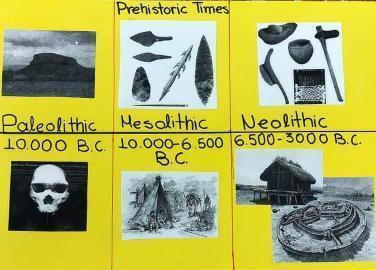
PREHISTORIC TIMES:
PALEOLITHIC TIMES
The word Paleolithic comes from the Greek word palaios which means old and lithos which means stone. Key Middle Palaeolithic sites in Greece are: Theopetra cave which is a site very close to Meteora, Asprochaliko,Kokkinopilos, Klissoura, Lakonis, Kalamakia.
According to archaeologists, the THEOPETRA cave is likely to be the place of the oldest human construction on earth, as findings indicate that the shelter was inhabited as early as 130,000 (a hundred and thirty thousand) years ago.
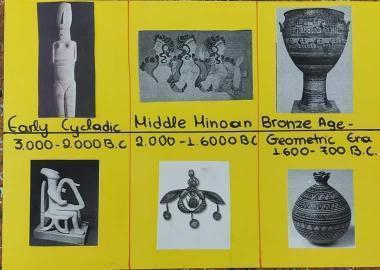
CYCLADIC CULTURE
was a Bronze Age culture (c. 3200–c. 1050 BC) found throughout the islands of the Cyclades in the Aegean Sea.
MINOAN
The Minoan civilization was a Bronze Age Aegean civilization on the island of Crete and other Aegean Islands.
It represents the first advanced civilization in Europe, leaving behind a number of massive building complexes, sophisticated art, and writing systems.
BRONZE AGE
The Mycenaean civilization was the last phase of the Bronze Age in Ancient Greece.
Also during the last centuries of this period we have a new phase of Greek art, the Geometric art, which is characterized by the geometric motifs in vase painting.
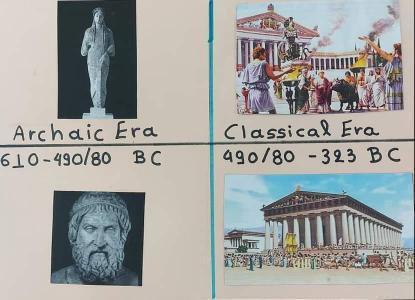
ARCHAIC ERA
In the archaic period, Greeks settled across the Mediterranean and the Black Seas, as far as Marseille in the west and Trebizond in the east. By the end of the archaic period, they were part of a trade network that spanned the entire Mediterranean.
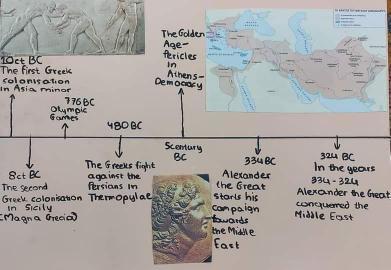
On the chart above you can see some of the most important chronologies of the Classic era for Greece. The Classical era ended after Philip the second managed to unify most of the Greek world against the common enemy of the Persian Empire, which was conquered within 13 years during the wars of Alexander the Great, Philip's son.
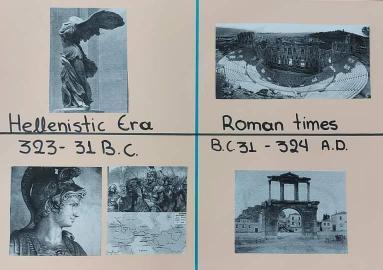
MEDIEVAL GREECE
Medieval Greece has a history that mainly coincides with that of the Byzantine Empire itself.
The emperor Constantine the Great founded a new imperial capital of the Eastern Roman Empire and Byzantine Empire, under the name Constantinoupolis (which in Greek means the city of Constantin) in 330 AD. This city is now called Istanbul.
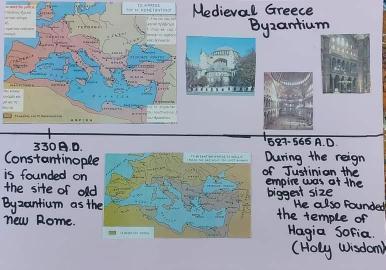
During the reign of Justinian the Byzantine empire was at its biggest size. (see the map
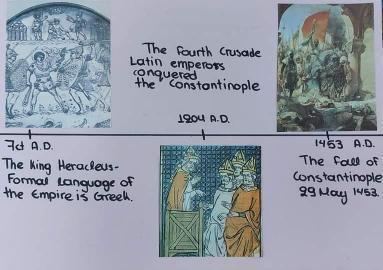
7ct AD
In the seventh century a very important emperor was Heracleos. He fought against many enemies of the greek byzantine empire and founded the greek language as the formal language of the empire.
in 1204 ADDuring the 4th crusade the Crusaders looted the capital Constantinoupolis and stole the majority of its treasures, which were brought to Venice and Italy. The Latin emperors’ decision to attack the world's largest Christian city was cruel. Reports of Crusaders' looting and brutality scandalised and horrified the Orthodox world and the relations between the Catholic and Orthodox churches were entirely wounded for many centuries afterwards, and would not be easily repaired until modern times.
The Byzantine Empire was left much poorer, smaller, and ultimately less able to defend itself against the Seljuk and Ottoman conquests that followed, until its final fall in 1453 AD (fourteen fifty three).
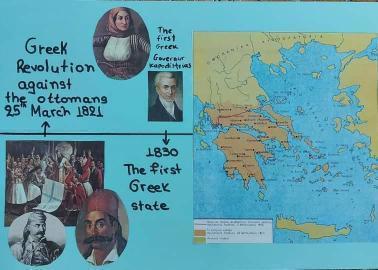
Greek Revolution
The Greeks, despite the fact that they were almost 400 years under Ottoman oppression, preserved their language and religion. There were several attempts to revolt during those centuries but with no success. The final and successful revolution began in 1821 (eighteen twenty one) and the first recognition of the Greek state was in 1830 (eighteen thirty).
This new state included only a small area and there were still many Greeks enslaved on the north, in the regions of Thessaly, Macedonia, Epirus, Thrace and Asia Minor, regions which were to be deliberated the following years.
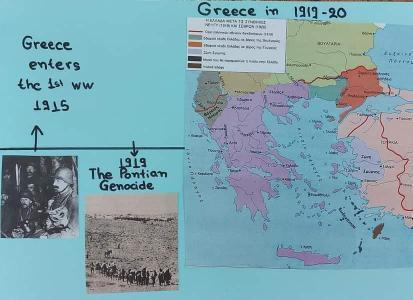
In 1915 (nineteen fifteeen)
Greece enters the 1st World War and in 1919 (nineteen nineteen) the Ottomans began the Greek pontian genocide of the Greeks who were living on the seashore of the Black sea under the guidance of Kemal Attaturk. During this genocide almost 300.000 (three hundred thousand) people of Greek origin were killed.
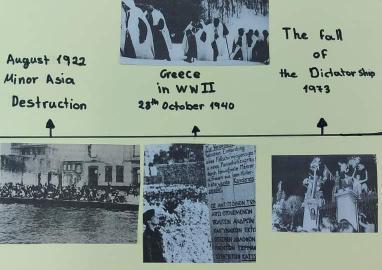
In 1922
Greece lost the part of Asia Minor which was given to her by the winning forces of Triple Entente and millions of Greeks were killed by Ottomans. Those who survived arrived in several regions of the deliberated Greece, and left their huge fortunes back.
In the 28th of October 1940
The fascist Italians are declaring war to Greece and like that Greece had to enter into the second world war.
After the end of the war the political state in Greece was unstable and there was a civil war.
The Democracy we have now began to establish after the revolt against the Dictatorship.